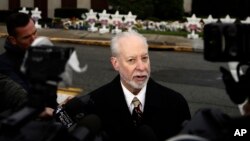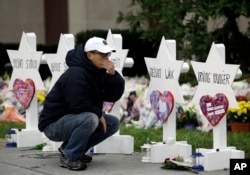While condemning Saturday’s deadly mass shooting at a Jewish synagogue in Pittsburgh, Pennsylvania, faith and civil rights leaders are urging a more respectful and less vitriolic national discourse to combat extremism, racism and hate crimes in America.
“Violence as a response to political, racial or religious differences must be confronted with all possible effort,“ the head of the U.S. Conference of Catholic Bishops, Cardinal Daniel DiNardo, said. “God asks nothing less of us. He begs us back to our common humanity as his sons and daughters.”
“This attack is on American values and principles of humanity, and we all need to come together to restore civilized values to our society,” Safdar Khwaja, Pittsburgh chapter president of the Council on American-Islamic Relations, said in a statement.
The Anti-Defamation League, which fights the scapegoating and smearing of Jews worldwide, noted that accused shooter Robert Bowers posted online commentary rife with anti-Semitic tropes.
“With such vehemently anti-Semitic and anti-immigrant opinions routinely promoted by white supremacists, coupled with demagogic anti-immigrant rhetoric from many ostensibly mainstream media sources and public figures, it is not hard to imagine that such hateful rhetoric may have played a role in tipping Bowers (toward violence),” the ADL said in a post on its website.
Some are pointing fingers.
“(Anti-Semitic) conspiracy theories are perpetuated and elevated by the increasing amount of hateful rhetoric flying from the mouths, or keyboards, of a growing cast of characters, up to and including President Trump,” the Southern Poverty Law Center said in a statement.
“The Council on American-Islamic Relations has noted a spike in bigotry following the election of Donald Trump that has resulted in an increased number of hate crimes against minorities across America,” CAIR said in a statement provided to VOA. “The president of the United States continues to sow deep racial and political divides that have inspired domestic terrorists like the Pittsburgh shooter and the Florida mail bomber.”
The group added, “America needs cross-cultural and interfaith understanding and discourse that would make the nation truly ‘great.’”
President Donald Trump rejected such criticism on Twitter Monday, saying the news media are to blame for bitter divisions and toxic discourse in America.
“The Fake News is doing everything in their power to blame Republicans, Conservatives and me for the division and hatred that has been going on for so long in our Country. Actually, it is their Fake & Dishonest reporting which is causing problems far greater than they understand!” the president tweeted.
Democrats have long accused Republicans in general and Trump in particular of sowing discord, a charge now amplified after a spate of attempted mail bombings targeting prominent Democrats and the news media, as well as the attack in Pittsburgh.
“When politicians no longer abide the social norms that demand civility and respect for those with different views, backgrounds and beliefs, it sets a tone and lays the groundwork for emboldening those who are driven to such despicable actions [as the synagogue attack],” New York Democratic Rep. Jerry Nadler tweeted. “We must do better, and demand better from those who we expect to set an example because of the platform their positions provide.”
From coast to coast, Republicans have condemned the shootings in Pittsburgh, as well as the mail bombs, for which an ardent Trump supporter, Floridian Cesar Sayoc, has been accused. But they note that divisive messaging spans America’s political spectrum and that extremism flourishes on the far-left as well as the far-right.
For weeks, Republicans have accused Democrats of engineering “angry mobs” to harass backers of Trump-nominated Supreme Court Justice Brett Kavanaugh. South Carolina Republican Sen. Lindsey Graham repeated the charge after protesters had to be forcibly removed from a recent campaign event he attended in Tennessee.
“The only people wanting to yell at me would turn the country into a mob,” Graham told Fox News. “It’s getting worse because emotions are running high.”
Even so, there is some evidence that key Republicans are re-thinking their messaging. Trump and party leaders have long railed against billionaire Democratic Party donor George Soros, who was a target of the attempted mail bombings.
House Majority Leader Kevin McCarthy, a California Republican, recently deleted a tweet in which he said Republicans “cannot allow Soros … to BUY this election!”
History shows that rhetoric is often more restrained after a horrific event, but the effect is fleeting. For a brief time, politicians vehemently opposed to gay rights appeared more cautious in their pronouncements after the grisly murder of gay University of Wyoming student Matthew Shepard in 1998.
Today, demands are growing for lasting reform of discourse in America, with civility and forbearance as guiding principles.
“We must say no to hate, fear-mongering and the demonization of differences,” the National Association for the Advancement of Colored People said in a statement. “We must express our opposition to hatred in all aspects of our lives including economic, social and at the ballot box. We must support those individuals, institutions, and organizations which call for inclusion. If we remain silent, then those who champion stratification and division, win.”

















